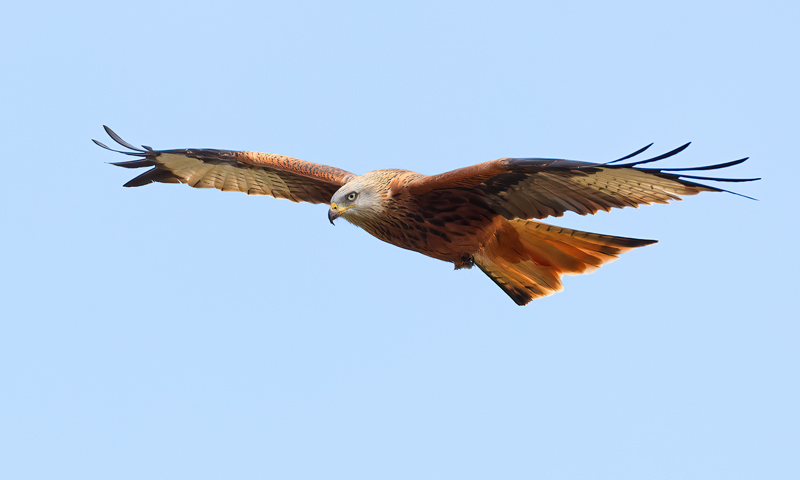The RSPB’s Birdcrime 2021 report, published today, reveals 108 confirmed incidents of bird of prey persecution in the UK. In England alone there were 80 confirmed incidents: this is the second-highest figure on record for England after 2020’s unprecedented surge.
The total includes 50 buzzards, 16 red kites, seven peregrines and three goshawks. Hen harriers, golden eagles and white-tailed eagles continue to be affected.
Despite all birds of prey being protected by law since the 1950s and more recently under the Wildlife and Countryside Act 1981, the majority of victims were either shot, trapped or poisoned. Scientific papers, intelligence and satellite tagging studies for key species such as hen harrier have confirmed that the annual Birdcrime totals are only the tip of a far larger iceberg and that many killings go undetected and unreported.
One shocking incident involved a gruesome mass grave of birds of prey located by RSPB Investigations and the Police down a well on a pheasant shoot in Wiltshire.
In Scotland, a golden eagle was found poisoned, lying beside a dead hare laced with the same deadly banned pesticide, on a grouse shooting estate with a history of raptor persecution.

Red Kite, copyright Glyn Sellors, from the surfbirds galleries
In Wales, RSPB Investigations officers assisted North Wales Police in investigating a poisoned red kite and a shot buzzard and uncovered “the worst case of illegal pesticide storage” the team had ever seen. 18 toxic products, many of which are banned, were found on a pheasant shooting estate.
In addition, of growing concern is an unprecedented surge in the detection of brodifacoum (a rat poison) in birds of prey at concentrations well beyond lethal levels, which is indicative of misuse, or abuse, to directly target birds of prey. This is an issue not just for birds but for other wildlife, people, pets and the environment. This was evidenced by the discovery of a rare white-tailed eagle in Dorset poisoned with seven times the lethal dose of brodifacoum.
In 2021, over two thirds (71%) of all confirmed incidents of raptor persecution related to land managed for gamebird shooting, where birds of prey are seen by some as a threat to gamebird stocks and illegally killed.
Two of the worst counties based on 2021 data – Norfolk (13 incidents) and Dorset (12 incidents) – are lowland areas, dominated by pheasant and partridge shooting. The third worst county was North Yorkshire (10 incidents), which includes grouse, pheasant and partridge shooting.
Raptor persecution continues to affect the population recovery of hen harriers: a rare moorland breeding bird which should be a far commoner sight. Reports for over two decades have identified criminal persecution as the main factor suppressing the UK hen harrier population. Modern technology in the form of GPS satellite tagging continues to reveal suspicious disappearances of young hen harriers, including Asta, whose Government-funded tag was later found inexplicably attached to a dead crow. Her body was never recovered. However the circumstances are highly suspicious.
Mark Thomas, RSPB head of investigations UK, said: “The data in this report clearly show that raptor persecution remains at a sustained high level, especially in England, with over two thirds of the incidents connected to land managed for gamebird shooting.
“The illegal shooting, trapping and poisoning of birds of prey has no place in modern society. In a nature and climate emergency, the deliberate destruction of protected species for financial gain is completely devastating and unacceptable.
“The time for reform is now long overdue. Licensing driven grouse moors is the first step in clamping down on those estates engaged in criminal activity at no loss to those operating within the law.”
In December 2021, a UN assessment on UK wildlife crime, requested by the Department for Environment, Food & Rural Affairs (Defra), was published. It contained several recommendations on raptor persecution, including stronger regulation of the shooting industry. The RSPB is urging the Government to take these UN recommendations forward urgently, and to follow Scotland’s example in introducing licensing for driven grouse shooting.
Beccy Speight, RSPB chief executive, said: “The evidence shows that the illegal persecution of birds of prey – which is time and time again linked to gamebird shooting – is holding back the recovery of some key species. This year’s Birdcrime report is another reminder of the appalling methods deployed by some, and why there is a need for swift and effective change in our countryside. The United Nations report makes clear what must be done to end these wildlife crimes and we call on the new government in Westminster and governments around the UK to act and pave the way towards a sustainable future, respectful of the law.”
Strong enforcement partnerships, a robust RSPB Investigations team and a passionate body of supporters are creating a force to be reckoned with against raptor persecution. But only Government action will ensure birds of prey are kept safe from illegal persecution for good.
The RSPB is calling for:
- an introduction of licences for all driven grouse shooting
- better enforcement of existing regulation and additional regulation for pheasant and partridge shooting
- better, enforceable General Licence conditions